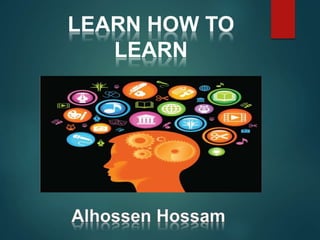Learn how to learn
- 2. Content Part A) Study skills 1- How to set a goal? 2- Self study system 3- Reflective learning 4- How to ask questions? 5- Time management 6- Preparation for exam Part B) Online research strategies 1- How to make an online resources Ą°bookmarksĄą? 2- Advanced search ? Extension files 3- MOOCS
- 3. Part A) Study skills
- 4. Study skills Pay attention in class Keep an organised Notebook Take good notes Ask questions in class
- 5. Plan a definite study time and place for each day DonĄŊt sleep for hours the night before a test
- 6. Before doing anything for yourself you should set a goal and find the best ways to achieve it. The goal should be SMART 1- How to set a goal?
- 7. 2- Self study system 1. What do you need? to learn what? 2. Ask experts 3. Join learning communities 4. Build Educational Plan 5. Set educational goal and try to achieve it 6. Start from the easiest 7. Find a reason of enjoyment in every thing you do 8. Search for 3 types of data 1- Videos 2- Books 3- Audio 9. Tools Material (resources) Paper, pen, Ą Laptop, timer 10.Time to learn Time to try Time to work Time to grow 11.Learner Autonomy 12.Motivation
- 8. Study for your learning style
- 9. 3- Reflective learning ? What is reflective learning? ? Time for reflection ? Ways to reflect
- 10. ? Reflective learning means thinking about your performance and try to improve it ? Reflective learner should ask questions such as: - What was successful? Strengths - What was unsuccessful? Weaknesses - How can I improve my performance?
- 11. - Reflection can occur a any time. It may be during the lesson - A good time for reflection is after a lesson and it is good practice to record your thoughts. ? Time for reflection
- 12. 1. Feedback Collection ĻC one-minute paper (at the end of each lesson) 2. Feedback Questions -- Peer observation ĻC Observe and be observed 3. Written Accounts of Experiences ĻC Self-reports ĻC Journal writing ĻC Collaborative diary keeping ĻC Recording lessons ? Ways to reflect
- 13. 4- How to ask questions? ? Who? ? Think before answer ? Ask in the suitable time ? Write down each question
- 14. Who I ask? If you need help ask: ? Teachers ? Classmates ? Family ? The internet
- 16. ?The best way to manage your time is prayer
- 17. 6- Preparation for exam ? Few tips ? DonĄŊt waste your time ? Last day before exam
- 18. ?Be Prepared ?Prioritize Subjects ?Compile All Notes ?Find a Student-Mentor ?Important Questions ?Practice, Practice & Practice ?Few tips
- 19. NO Facebook NO Email No WhatsApp ItĄŊs EXAM TIMES ? DonĄŊt waste your time
- 20. ?Last day before exam
- 21. Part B) Online research strategies
- 22. 1- How to make an online resources Ą°bookmarksĄą?
- 23. 2- Advanced search ? Extension files ? Search for 3 types of data using extension files: 1- Videos 2- Books 3- Audio
- 24. Examples of extension files
- 25. ?Search for 3 types of data using extension files: 1- Videos + photo 2- Books / text files 3- Audio
- 26. What is a MOOC? Massive Student numbers can be over 100,000 Open Study any course, anywhere at any time Online As opposed to face-to-face or blended Course Learning units in an academic subject 3- MOOCS



























